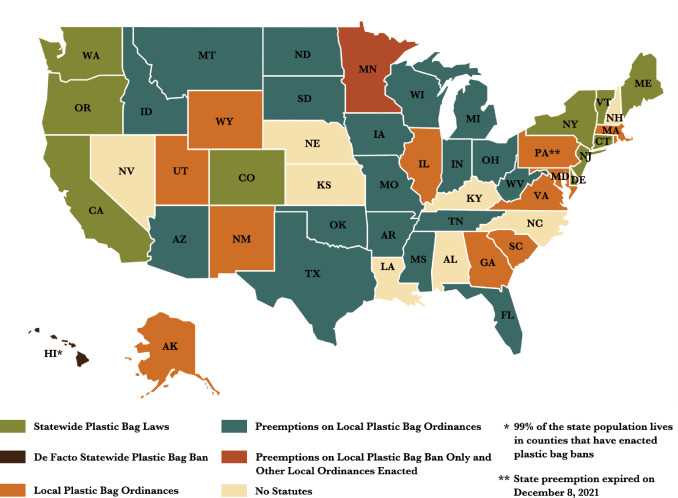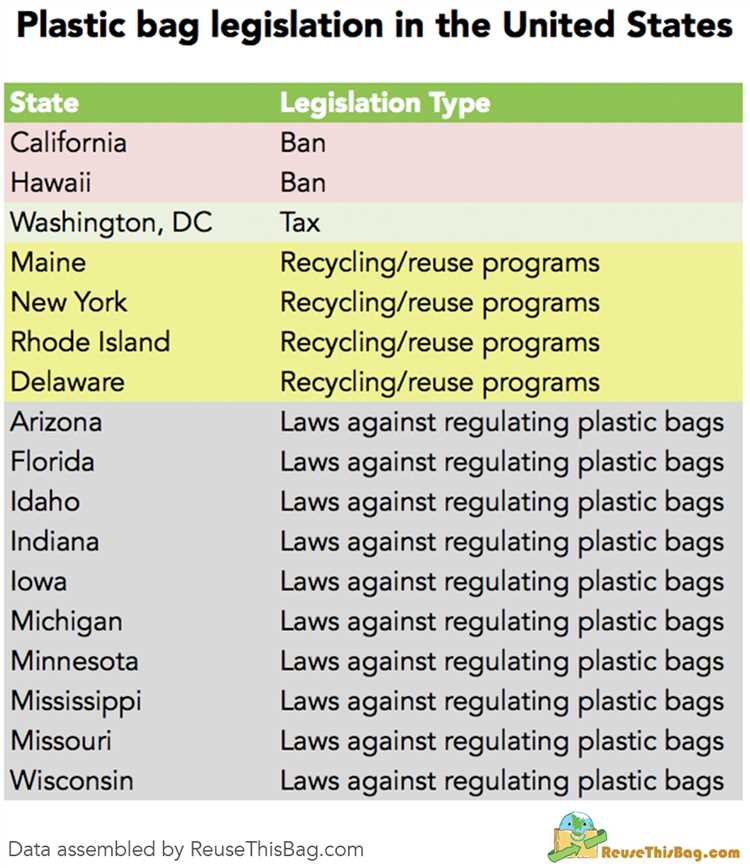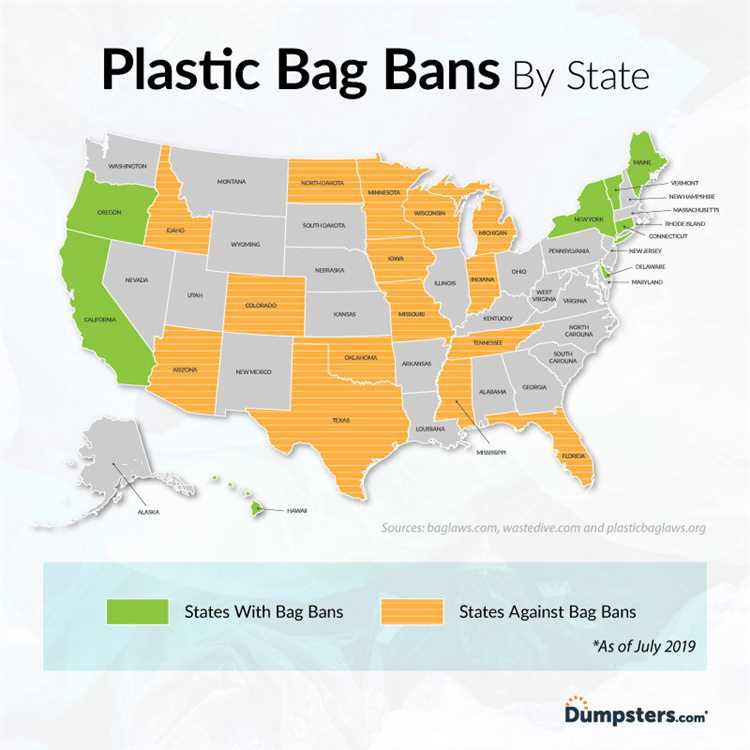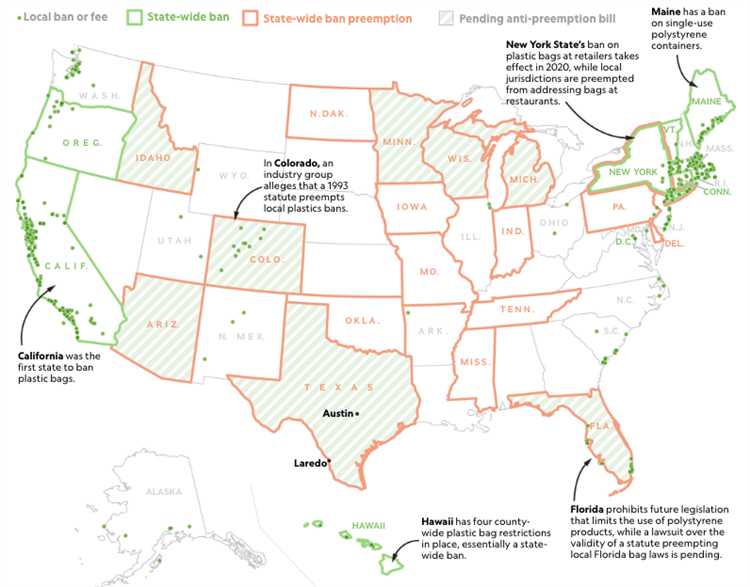
In recent years, the environmental impact of plastic waste has become a growing concern worldwide. As a response to this issue, many countries around the globe have implemented various measures to reduce or ban the use of single-use plastics. The United States, being one of the largest contributors to plastic pollution, has also taken steps to address this problem.
The plastic ban in the USA has gained significant attention and has sparked a debate among environmental activists, policymakers, and businesses. The aim of this article is to provide you with a comprehensive overview of the plastic ban in the USA and what you need to know about it.
The ban primarily targets single-use plastic items such as plastic bags, straws, cutlery, and Styrofoam containers. These items are known for their limited lifespan and significant environmental impact. By implementing the ban, the USA aims to reduce plastic waste generation, promote sustainable alternatives, and protect its natural resources.
- About Plastic Ban in USA
- Environmental Impact of Plastic
- The Need for Plastic Ban
- The Environmental Impact
- The Human Health Concerns
- Plastic Ban Regulations and Policies
- 1. State-level Bans
- 2. Federal Regulations
- 3. Corporate Initiatives
- Alternatives to Plastic
- 1. Paper
- 2. Glass
- Benefits of Plastic Ban
- Question-answer:
- What is the plastic ban in the USA?
- Why is there a plastic ban in the USA?
- When will the plastic ban in the USA take effect?
- What are the alternatives to single-use plastics?
About Plastic Ban in USA
The plastic ban in the USA refers to the increasing efforts to reduce the usage of single-use plastic products across the country.
Plastic waste has become a significant environmental concern as it takes hundreds of years to decompose and can harm ecosystems and wildlife. In response to this issue, various states and cities in the USA have implemented or proposed bans on plastic bags, straws, bottles, and other single-use plastic items.
These bans aim to encourage people to switch to more sustainable alternatives, such as reusable bags, biodegradable straws, and refillable water bottles. By reducing the demand for single-use plastics, the hope is to minimize pollution, protect marine life, and promote a healthier environment.
The plastic ban in the USA has gained momentum in recent years, with several states, including California, New York, and Hawaii, leading the way in implementing comprehensive bans on specific plastic products. Additionally, many cities and municipalities have enacted their own restrictions on plastics.
While there is some debate surrounding the effectiveness and economic impact of these bans, there is a growing recognition of the need to address plastic pollution and transition to more sustainable alternatives. Public awareness and activism have played a vital role in driving the plastic ban movement forward.
In conclusion, the plastic ban in the USA represents a crucial step towards reducing plastic waste and protecting the environment. By implementing these bans, individuals, businesses, and policymakers can work together to create a more sustainable future for all.
Environmental Impact of Plastic

Plastic pollution has become a worldwide issue, with significant environmental consequences. The production, consumption, and disposal of plastic products have a profound impact on our planet.
One of the major environmental impacts of plastic is its contribution to marine pollution. Plastic waste that ends up in the oceans poses a serious threat to marine life. Marine animals, such as sea turtles and seabirds, often mistake plastic debris for food and can suffer from ingestion or entanglement. This not only harms individual animals but also disrupts entire ecosystems.
Furthermore, plastic pollution has a negative impact on terrestrial ecosystems as well. Plastic waste that is improperly disposed of can leach harmful chemicals into the soil and water, contaminating ecosystems and potentially harming plants, animals, and humans. Additionally, plastics can take hundreds of years to decompose, resulting in long-term pollution.
Plastic production also contributes to climate change. The extraction and refinement of fossil fuels, which are used as raw materials for plastic production, release greenhouse gases into the atmosphere. These gases contribute to the warming of the planet and the changing climate patterns, leading to severe environmental consequences.
It is not only the production and disposal of plastic that has negative environmental impacts. The use of single-use plastics contributes to the problem as well. These items, such as plastic bags and straws, are often used for a short time and then discarded. They end up in landfills or as litter, further polluting the environment and contributing to the depletion of natural resources.
Addressing the environmental impact of plastic requires a multi-faceted approach. It involves reducing plastic production and consumption, promoting recycling and waste management, and encouraging the use of alternative materials. By taking action to reduce plastic waste, individuals and communities can make a significant positive impact on the environment and help create a more sustainable future.
The Need for Plastic Ban
Plastic pollution is a pressing issue that needs immediate attention and a ban on plastic is necessary to mitigate its harmful effects. Plastic is one of the most ubiquitous materials in the world, and its production and consumption have increased exponentially in recent years.
Plastic waste, especially single-use plastics like straws, bags, and bottles, has devastating effects on the environment. It takes hundreds of years for plastic to degrade, and during this time, it accumulates in landfills, water bodies, and natural habitats. Marine life, such as turtles, dolphins, and sea birds, mistake plastic for food and often die due to ingestion or entanglement.
The Environmental Impact

The environmental impact of plastic pollution goes beyond just marine life. Plastic waste also affects terrestrial ecosystems, posing a threat to wildlife on land. Additionally, burning plastic releases harmful pollutants into the air, contributing to air pollution and climate change.
Moreover, the production of plastic involves the extraction of fossil fuels, such as oil and gas, which are non-renewable resources. This extraction process leads to pollution, habitat destruction, and contributes to global warming.
The Human Health Concerns
Plastic pollution also poses significant risks to human health. Microplastics, tiny fragments of plastic that result from the breakdown of larger plastic items, have been found in various food and water sources. These microplastics can enter the human body through ingestion or inhalation and have been linked to various health issues, including reproductive problems and hormonal imbalances.
Furthermore, the manufacturing and disposal of plastic waste release harmful chemicals, such as phthalates and bisphenol A (BPA), which can leach into the environment and contaminate water sources and soil. These chemicals have been associated with adverse health effects, including developmental abnormalities and increased risk of certain cancers.
Considering the extensive environmental and health consequences of plastic pollution, a ban on plastic is essential to protect our planet and future generations. It is crucial to promote sustainable alternatives and implement recycling programs to reduce plastic waste and create a cleaner and healthier environment for everyone.
Take action and support plastic ban initiatives to make a positive impact on the environment and safeguard our well-being.
Plastic Ban Regulations and Policies
The issue of plastic pollution is a growing concern globally, and the United States has taken steps to address this issue through various regulations and policies. These regulations aim to reduce the use of single-use plastics and promote sustainable alternatives. Here are some key plastic ban regulations and policies in the USA:
1. State-level Bans
Several states in the USA have implemented laws to ban or limit the use of certain single-use plastics. For example, California has banned the use of single-use plastic bags in grocery stores, and New York has implemented a ban on foam food containers. These state-level bans aim to reduce plastic waste and encourage the use of reusable alternatives.
2. Federal Regulations
The US federal government has also taken steps to address the plastic pollution problem. In 2015, a ban on the manufacture and sale of microbeads in personal care products was enacted, as these tiny plastic particles were found to be polluting water bodies. Additionally, the federal government has implemented regulations to promote recycling and the use of recycled plastics in various industries.
Furthermore, the Biden administration has expressed its commitment to combating plastic pollution by signing executive orders and proposing legislation to reduce plastic waste. This includes a ban on single-use plastics in federal facilities and efforts to promote the development of a more circular economy for plastics.
3. Corporate Initiatives
Many corporations and businesses in the USA have also taken voluntary steps to address plastic pollution. Several major companies have pledged to reduce plastic packaging and increase the use of recyclable materials. Additionally, some retailers have implemented initiatives to encourage customers to bring their own bags or use reusable options.
In conclusion, plastic ban regulations and policies in the USA aim to tackle the problem of plastic pollution by reducing the use of single-use plastics and promoting more sustainable alternatives. These regulations exist at both the state and federal levels, and many businesses are also taking voluntary steps to address this issue. By implementing and following these regulations, the USA is moving towards a more environmentally-friendly future with reduced plastic waste.
Alternatives to Plastic
In response to the plastic ban in the USA, many individuals and businesses are seeking alternatives to plastic. Here are a few sustainable options:
1. Paper

Paper products can be a great alternative to plastic. Many companies are transitioning from plastic bags to paper bags, which are biodegradable and can be recycled. Paper straws are also becoming more popular and are an eco-friendly choice.
2. Glass
Glass is another alternative to plastic that is gaining popularity. Glass bottles and containers can be reused multiple times, reducing waste. Many beverages now come in glass bottles, and glass jars can be used for storing food or other items.
Additionally, glass is a more sustainable option because it is made from natural materials and can be recycled indefinitely without losing its quality.
Other alternatives to plastic include metal, bamboo, and cloth. Each of these materials has its own advantages and can be used in various products, such as reusable water bottles, utensils, and grocery bags.
By choosing alternatives to plastic, individuals can help reduce the negative impact of plastic on the environment and encourage sustainable practices.
Benefits of Plastic Ban
A plastic ban in the USA would have numerous benefits for the environment and society as a whole. Here are some of the key advantages:
- Reduced pollution: Plastic waste is a major contributor to pollution, particularly in bodies of water. By banning plastic, we can reduce the amount of waste that ends up in our oceans, rivers, and lakes, helping to protect marine life and ecosystems.
- Conservation of resources: Plastic production requires significant amounts of oil and natural gas. By banning plastic, we can conserve these limited resources and reduce our dependence on fossil fuels.
- Healthier ecosystems: Plastic waste can harm wildlife and disrupt ecosystems. By eliminating plastic, we can help create healthier habitats for animals and promote biodiversity.
- Improvement in recycling: A plastic ban can lead to increased investment in and innovation for recycling alternatives, such as biodegradable materials or more sustainable plastics. This can help improve recycling rates and reduce the amount of plastic waste that goes to landfills.
- Economic opportunities: A shift away from plastic can create new economic opportunities, such as the development of alternative materials and the growth of eco-friendly industries. This can lead to job creation and stimulate economic growth.
- Public health benefits: Plastic contains harmful chemicals that can leach into food and water, posing potential health risks. By banning plastic, we can reduce the exposure to these chemicals and improve public health.
These are just a few of the many benefits that a plastic ban in the USA could bring. By taking action to reduce plastic waste, we can protect the environment, conserve resources, and create a healthier and more sustainable future for all.
Question-answer:
What is the plastic ban in the USA?
The plastic ban in the USA refers to the efforts being made to reduce or eliminate the use of single-use plastic products. This includes items such as plastic bags, straws, and styrofoam containers.
Why is there a plastic ban in the USA?
The plastic ban in the USA is being implemented to address the significant environmental impact of plastic waste. Single-use plastics are not easily recyclable and end up in landfills or as litter, polluting our oceans and ecosystems. The ban aims to reduce plastic consumption and promote more sustainable alternatives.
When will the plastic ban in the USA take effect?
The implementation of the plastic ban in the USA varies depending on the state and city. Some places have already implemented full bans on certain plastic items, while others are phasing them out over time. It is important to check the specific regulations in your area to know when the ban will take effect.
What are the alternatives to single-use plastics?
There are several alternatives to single-use plastics that are becoming more widely available. These include reusable bags made of cloth or other durable materials, metal or bamboo straws, and compostable food containers made from materials like sugarcane or cornstarch. It is important to adopt these alternatives to reduce our reliance on single-use plastics.